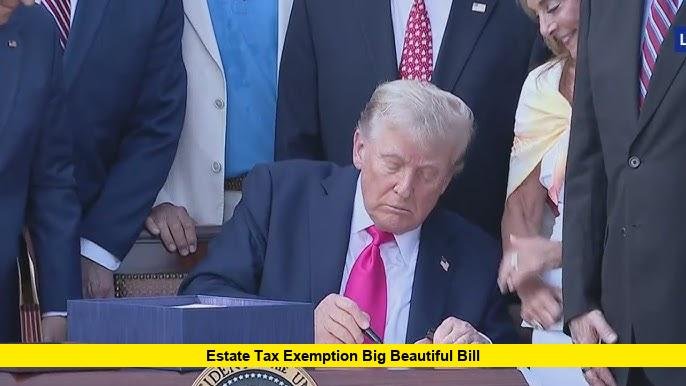The estate tax exemption big beautiful bill has officially raised the federal estate, gift, and generation-skipping tax exemption to $15 million per individual beginning in 2026. Signed into law on July 4, 2025, this shift ensures that the once-temporary benefit will now be permanent and inflation-indexed. The move marks a significant policy change with major implications for estate planning.
Here’s the latest on this key development:
- The One Big Beautiful Bill Act established a $15 million exemption for 2026—up from approximately $13.99 million in 2025. Future increases will track inflation.
- Previously, without new legislation, the exemption would have reverted to roughly $7 million.
- For married couples, that means up to $30 million in assets can be transferred without federal estate or gift tax.
Key Points Summary
(For readers aiming to glance and grasp quickly)
- Permanent and indexed: The exemption is no longer temporary—it’s locked in and adjusts with inflation.
- High threshold: At $15 million per individual (or $30 million for couples), very few estates will face federal taxation.
- Effective 2026: The new limit starts on January 1, 2026; 2025 remains under the prior threshold.
- Planning focus shifts: With estate tax largely neutralized for many, attention moves to income, capital gains, and wealth management strategies.
Why This Matters Now
With the estate tax exemption big beautiful bill now law, estate planners and families can breathe easier—no end-of-year scramble to preserve high exemption levels. The permanence of the $15 million threshold offers stable ground for long-range strategies.
Previously, under the 2017 Tax Cuts and Jobs Act, the exemption had nearly doubled but was set to expire. Without action, the drop would’ve forced many to adopt complex trust arrangements to maintain tax relief. That scenario is now largely off the table.
Despite fewer estates reaching taxation thresholds, estate planning remains crucial. It ensures clarity, fairness, and control in asset distribution—even when taxes aren’t an immediate concern.
Planning Shifts in Light of the Estate Tax Exemption Big Beautiful Bill
Estate planning experts are adjusting to the new reality:
- With estate taxes off the radar for most, focus turns to capital gains, LIfe Insurance, and retirement account strategies.
- For older adults, Roth IRA conversions may be more attractive now that estate taxes are less urgent.
- Families may choose to spend or gift funds differently, leaning toward quality-of-life and legacy planning rather than tax avoidance.
FAQ
Q1: When does the new exemption take effect?
The $15 million exemption starts January 1, 2026. Estates and gifts in 2025 still operate under the roughly $13.99 million threshold.
Q2: Is the exemption permanent?
Yes. Unlike prior policy, the exemption is permanent and tied to inflation starting in 2026.
Q3: Will all estates now avoid tax?
Not necessarily. Only estates exceeding the exemption face federal estate tax. Also, state-level estate or inheritance taxes—such as in Maryland or D.C.—may still apply.
Key Takeaways
- The estate tax exemption big beautiful bill locks in a high federal exemption, reducing tax concerns for most estates.
- Stability now replaces uncertainty—families and professionals can plan with confidence.
- Estate planning remains essential for distribution, legacy, and non-tax goals.
- State tax rules still matter depending on where property is held or where the decedent resides.
Disclaimer: This article is for informational purposes only. We assume no accountability for how readers apply this content; consult a qualified professional for personal guidance.
